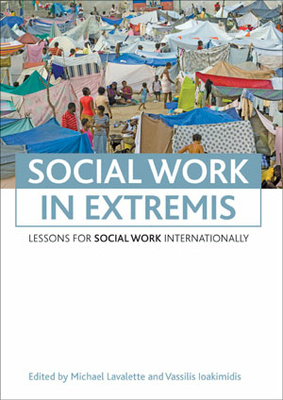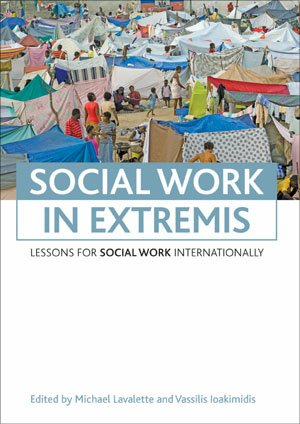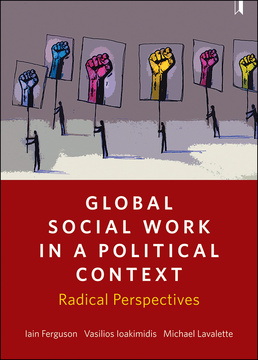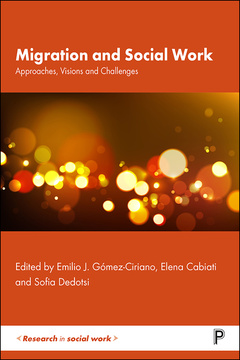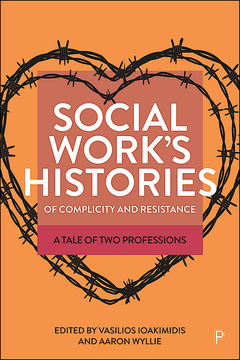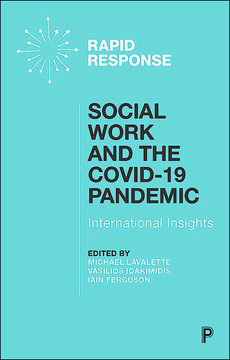Social work in extremis
Lessons for social work internationally
Edited by Michael Lavalette and Vasilios Ioakimidis
Published
May 4, 2011Page count
200 pagesISBN
978-1847427182Dimensions
240 x 172 mmImprint
Policy PressWhat is the relationship between social work and the state? Who controls which services needs are addressed and how? This important book looks at social work responses in different countries to extreme social, economic and political situations in order to answer these questions. Examples include: war situations, military regimes, earthquakes and Tsunamis. The results show the innovative nature of grass-roots provision and social work intervention and will be of interest to all social work academics, students and professionals.
"...easy to read with digestible and gripping chapters. I found that, after completing one chapter, I could not wait to get to the next... I would highly recommend this book
to social workers." Crystal L. Minors, Social Research Association News
"...the collection offers a breath of fresh air and would be a welcome addition to any library." Jill Manthorpe in Professional Social Work
"This is easily the most enjoyable social work book I have read for a decade." Practice Reflexions
"a fascinating read and offers insights from a variety of time and geographical perspectives...the position of the author impacted upon the choice of subject matter and his perspective...makes for a very enjoyable and informative read" Dr Simon Haslam, Director FMR Research Ltd
"This is an exciting book, which lifts one’s gaze from familiar domestic problems to those of global (primarily European) stress. It uses the experience of its authors in
disaster situations to revitalise the discussion about the boundary between social work and political action, and argues the need for different skills and different training in social workers." European Journal of Social Work
"This excellent collection represents a major contribution to a growing literature documenting the ways in which social workers continue to struggle for social justice in conditions of political oppression and adversity." Iain Ferguson, University of Stirling
Michael Lavalette is an Associate Professor of Social Work at Liverpool Hope University. He is also the national coordinator of the Social Work Action Network (SWAN).
Vasilios Ioakimidis is a Lecturer in Social Work and Social Pedagogy at Liverpool Hope University. He is also a member of the Social Work Action Network (SWAN) steering committee.
Introduction: Social work in extremis - disaster capitalism, 'social shocks' and 'popular social work' ~ Michael Lavalette; 'Popular social work' in the Palestinian West Bank: dispatches from the front line ~ Chris Jones and Michael Lavalette; Samidoun: grassroots welfare and popular resistance in Beirut during the 33-Day War of 2006 ~ Michael Lavalette and Barrie Levine; Grassroots community organising in a post-disaster context: lessons for social work education from Ilias, Greece ~ Maria Pentaraki; Grassroots community social work with the 'unwanted': the case of Kinisi and the rights of refugees and migrants in Patras, Greece ~ Dora Teloni; In search of emancipatory social work practice in contemporary Colombia: working with the despalzados in Bogota ~ Carmen Hinestroza and Vasilios Ioakimidis; Addressing social conflicts in Sri Lanka: social development interventions by a people's organisation ~ Ashok Gladston Xavier; International organisations, social work and war: a 'frog's perspective' reflection on the bird's eyes view ~ Reima Ana Maglajlic; Welfare under warfare: the Greek struggle for emancipatory social welfare (1940-44) ~ Vasilios Ioakimidis; Social welfare services to protect elderly victims of war in Cyprus ~ Gregory Neocleous; Worker's eye view of neoliberalism and Hurricane Katrina ~ Marla S McCulloch; Social work, social development and practice legitimacy in Central Asia ~ Terry Murphy; Conclusion: Social work in extremis - some general conclusions ~ Vasilios Ioakimidis.







